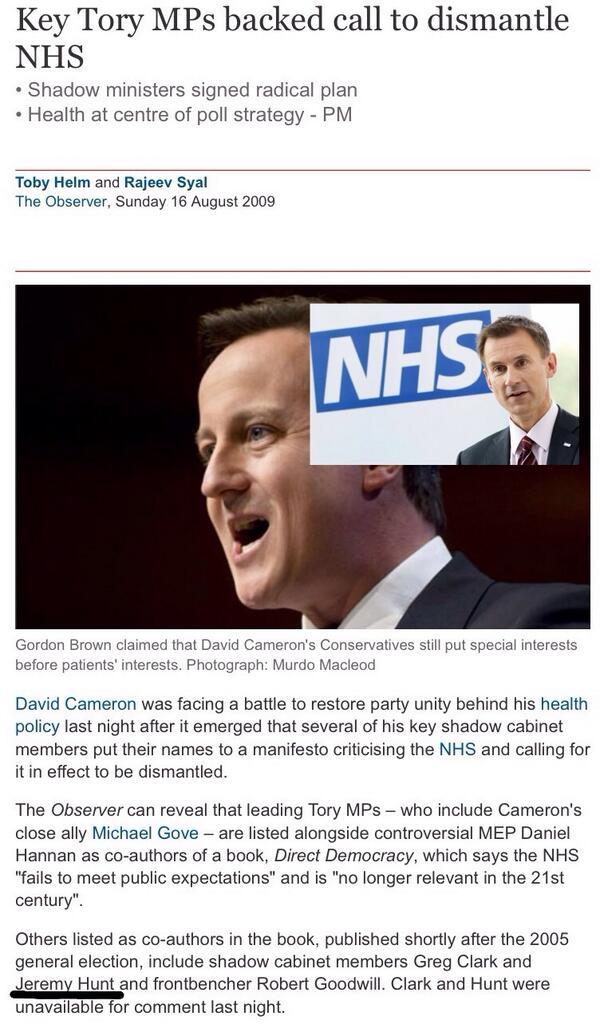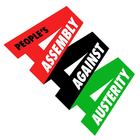Tory
The LibDem -Tory Plan to dismantle the NHS
Image Posted on Updated on
Write text here…
Related articles
- The Guardian: The Plot Against the NHS by Colin Leys and Stewart Player – review (derbyrankandfilenhsworkers.wordpress.com)
- How Labour Used Virgin ‘Restricted’ Report to Open NHS to Healthcare Companies (derbyrankandfilenhsworkers.wordpress.com)
- Does the narrow and regressive Tory party have a death wish? | Will Hutton (theguardian.com)
- United against a tory government (static-rants.com)
The Lib Dems – Yellow by Name, Yellow by Nature
Confirmation that the Lib Dems are the political equivalent of something you’d rather not get on your shoes came with their opposition to Labour’s parliamentary motion against the Bedroom Tax earlier this week.
Apart from Tim Farron and Andrew George, Lib Dem MPs swung behind the Tories and have thus condemned the hundreds of thousands impacted by this callous, cruel, and contemptuous Tory tax throughout the country to at least two more years of misery and despair up to the next general election in 2015.
The 31 Lib Dems who voted with the government were joined by a further 21 who avoided the issue by failing to vote. Making this latest betrayal even more staggering is that it came in defiance of their own party, which condemned the Bedroom Tax at their party conference in Glasgow in September.
What motivates a person to go into politics fuelled not by principle but rank opportunism? What is that gets such a person out of bed in the morning? Hopefully sometime in the future psychologists will explore the mindset of your average Lib Dem MP in an attempt to understand the minds of those who embrace betrayal as a virtue rather than, as with normal people, rejecting it as a vice.
Since joining with the Tories in a coalition government of the bad and mad, the Lib Dems have done politics a huge disservice, responsible for deepening people’s cynicism and disdain for the political process. Russell Brand’s recent interview with Jeremy Paxman, during which he articulated this disdain as the reason why he’s never voted, spoke to the huge gulf that exists between a growing constituency of people and those meant to represent them.
Step forward the Liberal Democrats.
Related articles
- Lib Dems hit out at leader Nick Clegg over commitment to more ‘Tory cuts’ after next election (independent.co.uk)
- The Tories and the Lib Dems plot their coalition endgames | Andrew Rawnsley (theguardian.com)
- Lib Dem treasury chief Danny Alexander accuses Tories of planning deep ‘ideological’ cuts in next term (independent.co.uk)
- Leader Nick Clegg under fire from Lib Dems over his backing for Tory cuts after next general election (independent.co.uk)
For the Sake of Humanity Society Must Unleash War on the Tories
John Wight
Writer
This, to clarify, will not be a war of aggression, it will be a war against their aggression on the part of those who understand that collectivism not individualism is what separates us from the abyss of barbarism.
The campaign of hate being waged by this government of rich, privileged, and privately educated sociopaths against the poor, the unemployed, and those who dare try to claim the benefits to which they are entitled is unparalleled in modern history. Even Thatcher in her pomp was not as malicious in her treatment of the aforementioned demographic. This was not because she didn’t wish to be more malicious than she was, it was because when she came to power we still had trade unions capable and willing to resist such an onslaught, meaning that the cost involved in even attempting to rip up the foundations of the welfare state and the collective ethos which lies at its heart would have been too damaging to her government and party to make worthwhile.
Three decades on and the fruits of Thatcherism – with the corresponding neutering of the unions and other forms of working class solidarity – have culminated in a new normal of demonisation and the near criminalisation of poverty in Britain. Austerity has been sold to the country as a policy of necessity in response to years of Labour profligacy and a bloated public sector. It is a lie so bold and barefaced that even Joseph Goebbels would blush while repeating it.
The economic crisis which began in the US and hit these shores in August/September 2007 was a consequence of an out of control international banking and finance industry – in other words private greed on the part of the rich, the very constituency favoured by and so exalted by the Tories. Britain’s public sector was neither bloated or out of control. On the contrary, under an economic system prone to volatility and unpredictable but periodic shocks, the public sector acts as a ballast of demand. If people are not spending then there is no demand for the goods and services produced by businesses, which results in a reduction in economic activity, borrowing, and investment and a concomitant rise in unemployment and government debt in order to meet the cost.
Related articles
- Toxic Tories put us on path to poverty (morningstaronline.co.uk)
- homelessness caused by malicious misanthropic tories (snookcocker.wordpress.com)
- For the Sake of Humanity Society Must Unleash War on the Tories (alternativenewsalert.com)
“Tory” Clegg leaves the door open to further welfare cuts
By George Eaton Published 16 December 2013
At his monthly press conference, the Deputy PM refuses to rule out
reducing the benefit cap or limiting child benefit to two children for out-of-work families.
George Osborne has made it clear that he plans to introduce “billions” more in welfare cuts if the Tories win the next election, including a possible reduction in the £26,000 household benefit cap and new limits on child benefit, but where does Nick Clegg stand? At the Deputy PM’s final monthly press conference of the year, I asked him whether he was prepared to consider a reduction in the benefit cap in the next parliament. He told me:
It’s not something that I’m advocating at the moment because we’ve only just set this new level and it’s £26,000, which is equivalent to earning £35,000 before tax…I think we need to keep that approach, look and see how it works, see what the effects are, but not rush to start changing the goalposts before the policy has properly settled down.
The key words here are “at the moment”. While Clegg again declared that he believed the priority should be to remove universal pensioner benefits from the well-off (“you start from the top and you work down”), he was careful not rule out a cut in the level of the cap. Similarly, on the Conservative proposal to limit child benefit to the first two children for out-of-work families, while Clegg said there was “something a bit arbitrary” about “a government saying how many children the state will or will not help support”, he refused to oppose the idea in principle. He said:
Is my priority returning to child benefit, as the first port of call, no it’s not. But I’m not going to start drawing great circles around this policy or that policy. I want to look at it in the round.
Related articles
- Clegg leaves the door open to further welfare cuts (newstatesman.com)
- Tory £12bn Welfare Cut Would Destroy The Social Security Safety Net, Warns TUC (welfarenewsservice.com)
- Nick Clegg signals he could consider Tory plan to cut £26,000 benefits cap (thisismoney.co.uk)
- Signal: Deputy Prime Minister Nick Clegg left the door firmly open to further … – Daily Mail (dailymail.co.uk)
- Nick Clegg branded an idiot by Alan Sugar after second free TV licenses blunder (mirror.co.uk)




